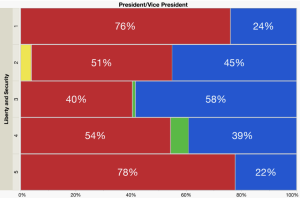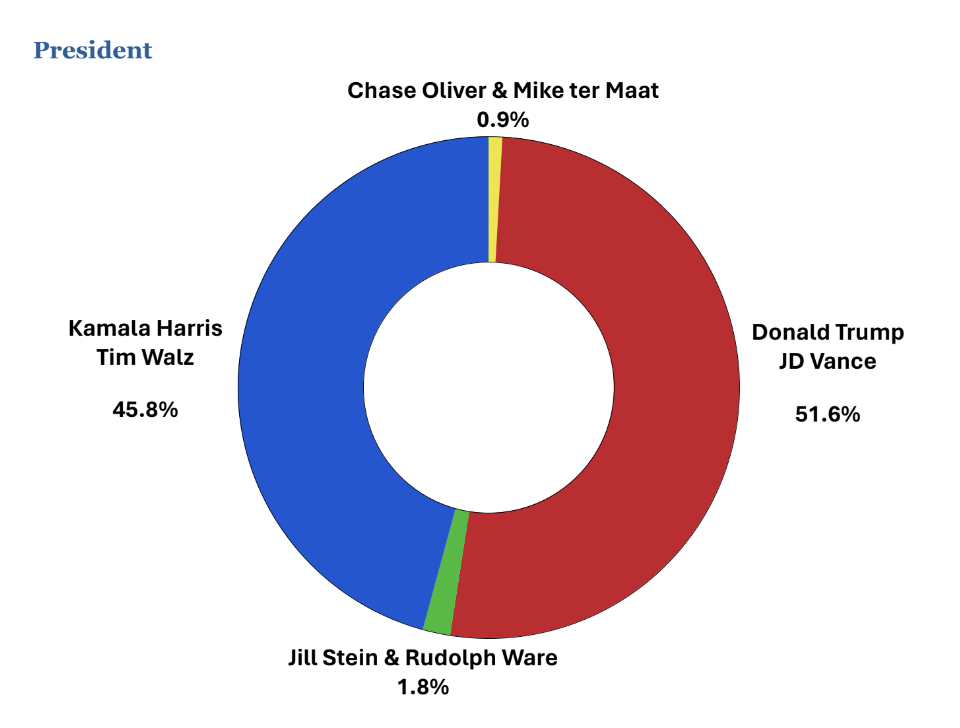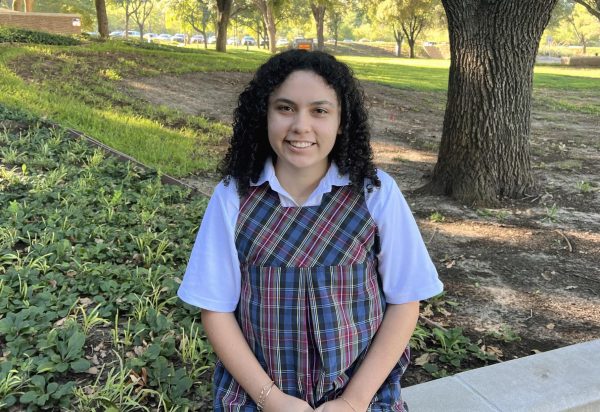On November 5, 2024, the United States Presidential Election took place following months of divisive campaigning, candidate-swapping, and heavily-criticized televised debates. Americans participating in the election were prompted to vote for either Vice President Kamala Harris and Minnesota Governor Tim Walz (Democratic), Former President Donald J. Trump and Ohio Senator J. D. Vance (Republican), Dr. Jill Stein and Butch Ware (Green), or Chase Oliver and Mike Ter Maat (Libertarian). In Texas, only these four presidential candidates appeared on the ballot. Select states’ ballots featured other third-party and independent candidates: Claudia De La Cruz and Karina Garcia (Socialism and Liberation), Randall Terry and Stephen E. Broden (Constitution), and Dr. Cornel West and Melina Abdullah (Independent).
Trump won Texas’ 40 electoral votes (following the state’s historically-red precedent) and Trump won the election on the federal scale, receiving 312 electoral votes of the necessary 270 from the total of 538. Trump also won the popular vote, with just under 77 million votes and 49.9% of voters. The election was called on the morning of November 6. Both Harris and Trump delivered their concession and victory speeches, respectively, on that day.
In addition to the Presidential race, the Texas ballot included selections for U.S. Senator, U.S. Representative, Railroad Commissioner, State and Appeals Courts Judges, Education Board Members, District Attorneys, and county/precinct positions, including constable. Contenders for judge positions and constable included former FWCD parents.
In Texas, 48.64% of registered voters cast their ballots, in comparison to 2020’s turnout of 66.73% of registered voters. However, as you must be 18 to vote in the U.S., the vast majority of Country Day students were unable to participate in the election. In the weeks preceding the election, though, Upper School faculty organized activities and presentations to keep students informed about democratic processes and the election – History Department Chair Colin Douglas ’06 spearheaded these arrangements, organizing (along with a committee of Upper School students) the school-wide “Democracy Day” celebration, which included a visit from Fort Worth Mayor Mattie Parker and previous mayoral election contender and Chair of the Tarrant County Democratic Party, Deborah Peoples.
“We – some of the students that worked [with Douglas] on Democracy Day – helped lay out some of the groundwork for all of it,” Maddox Wolfe ’25 said. “I think it’s important because it helped get people into politics, I mean, a lot of people are already into politics but it gave people a broader focus. I liked that we had a whole segment on local politics.”
On Monday, October 28, Douglas invited the Upper School student body and faculty/staff to participate in a Mock Election survey which mimicked the Texas ballot and included additional questions assaying students’ key issues, values, and preparedness to participate.
Over half of the Upper School community participated – a larger percentage turnout than Texas’.
“I mean, it makes sense that our voter turnout was more than Texas’ turnout: it takes time and effort to go and vote. But it’s your job as a citizen and definitely your job if you’ve had anyone fight for your right to vote,” Sara Teegarden, Upper School Government, said. “We don’t make it a holiday; it’s really hard if you work and you’re a single parent with multiple kids to go out and vote. I think what it shows you is that accessibility and drive to have a thought and opinion (and express that through voting) can be very limited if you feel like that voice doesn’t matter.”
In accordance with the national election’s presidential results, Country Day (student and faculty) polling also determined president-elect Trump as the winner, with he and Vance receiving 51.6% of the vote. Harris/Walz received 45.8% of the vote. Stein followed far behind with 1.8% of the vote and Oliver received just 0.8%. Interestingly, Country Day polling has followed Tarrant County’s voting pattern over the past two presidential elections. In 2020, the student body poll (granted it was unlike this year’s as it did not include faculty/staff) voted majorly for the Democratic Ticket, as did Tarrant County. This year, though, as Tarrant County flipped from Blue to Red (with Trump receiving 56.26% of the county’s vote), so did the Upper School.
Among the “Issues” section of the survey, Trump-voting participants were more likely to select “Economy,” “Taxes,” or “Military” for their top concerns than were Harris voters, who were more likely to designate “Environment,” “Education” or “Healthcare” as their largest issues.

Though percentages were more drastically separated in these statistics, more common ground was found amongst participants when they were prompted to pick their level of priority between two general concepts: “Equality v. Equity” and “Liberty v. Security.” For both of these topics, participants’ priorities were less split than may be expected in our harshly-divided political zeitgeist. For “Equality v. Equity,” votes between the scale of importance of both topics remained near-equally divided for each subsection: for the group which most valued equality, the vote was split between 57% Trump voters and 43% Harris voters; for the group which most valued equity, the vote was split 48/48. On “Liberty v. Security,” the voters on both of the most absolute sides were predominately Trump voters: they represented 76% of the liberty vote and 78% of the security vote. Harris voters were more likely to be moderate between the two, being most represented in the middle category.
It was in “Private Interests v. Common Good” where participants’ views most broadly differed. 95% of those most likely to highly value private interests also selected Trump as their preferred presidential candidate and 66% of those most valuing a common good selected Harris.
Participants were also asked to rank Country Day’s core values based on their importance. These splits were pretty equally divided between candidate supporters and most valued core values.
“The news and social media make things seem, I guess, pretty polarized, even more polarized than we are,” Nara Acuña Guba ’25 said. “But I think to the core, we all value similar things; I think our values are less associated with parties than people believe.”
Dr. Heather Peace, Upper School Mathematics, believes that ads – in addition to the news and social media – play a role in how we perceive political candidates’ values as different, even though we as citizens often share the same values.
“A lot of ads these days are targeted, and I feel like people are hearing ads say, ‘this candidate has these values,’ but these ads are targeted. It’s not that candidates’ values are different, it’s that we’re seeing ads that portray a candidate in a light that we want to see them and portray the opponent in a different light,” Peace said. “It’s not so much a question of value, but a question of basing opinion off of what you’ve heard rather than their actions.”
These trends generally followed when the same data regarding issues was extracted regarding which senatorial candidate participants chose.
For the senatorial races, going along with the trend in Republican candidates taking the majority, Ted Cruz won over Colin Allred in both the mock election and the actual senatorial election. In the mock election, though, Cruz won by a larger margin than Trump did, with 53.2%. For the House of Representatives race, Republican Craig Goldman (a TVS graduate) won over Democrat Trey Hunt, with 65%.
A key thing Douglas wanted to highlight about the survey was that it replicated the Texas election ballot exactly, all the way down to the smallest races – some that most students (and even adults) haven’t even heard of. Smaller races are typically underreported, and it can be difficult to find information about candidates.
“People look at just the presidency. [Local politics] are something that aren’t really talked about at all, even though the judges that you’re electing and such still have a huge impact on your life,” Wolfe said.
On the survey, as races got smaller (and additionally, as they were uncontested), participants were more likely to skip past participating in the votes. For example, for the Railroad Commissioner vote, 15% of participants skipped voting; for the District Judge of the 396th Judicial District, which was an uncontested race, 34% of participants skipped voting. Tarrant County, and the nation, voted similarly: smaller and uncontested races are generally more likely to produce less voter turnout, even though they are on the same ballot as everything else.
When asked on how prepared they felt to answer the survey, just under 70% of participants rated their preparedness a three or under (on a scale of one to five, with one being the least prepared and five being the most prepared). Only 31% of participants ranked their preparedness a four or a five.
“I didn’t really know anything about the local election stuff,” Ben Hatem ’25 said. “I felt less prepared because of that.”
Participants were then prompted to detail how they chose to vote for the positions and candidates which they were unfamiliar with. Most participants selected party affiliation as their method, while the other two most popular (but far less popular than party) were guesswork and simply leaving those positions blank. Others voted on name recognition or quick research before participating – some participants even used AI software like ChatGPT to get summaries on candidates and their positions.
The mock election provided a great opportunity for students who are under 18 to participate.
“It was kinda cool because I wanted to vote in the real [election],” Bella Rugema ’27 said. “There was a lot of positions I didn’t know about, so I learned about lesser known roles in government.”
For students who were actually able to vote for the first time, the mock ballot was a good preparation to see what they would be voting on. These students were happy to be able to participate in the nation politically beyond Democracy Day activities.
“It’s exhilarating that I got to make a difference – it was fun to partake in my civic duty,” Nola Gibbs ’25, first-time voter, said. “I felt that I had a voice.”
In the general election, Republicans won both the House of Representatives and the Senate, giving president-elect Trump a solid Republican majority to work with when he takes office in January. In the past weeks, Trump has also been announcing his ideas for key policy in his term, namely a 25% tariff on goods coming from Canada and Mexico; he has also been announcing his picks for cabinet members: notable selections include Elon Musk and Vivek Ramaswamy to head the new Department of Governmental Efficiency, Kash Patel for the director of the Federal Bureau of Investigations, and Fort Worth local lawyer and head of America First Policy Institute, Brooke Rollins, mother to current falcons Anna Rollins ’26 and Lily Rollins ’28. She has been nominated to be Secretary of Agriculture.
No matter which party or candidate you voted for – in the mock election or the real one – it’s important to stay informed, always respect other sides’ perspectives, and participate in civic discourse to move forward together as a nation.





